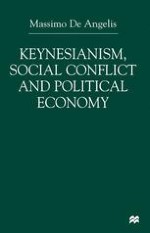2000 | OriginalPaper | Buchkapitel
Conclusion: Looking Ahead
verfasst von : Massimo De Angelis
Erschienen in: Keynesianism, Social Conflict and Political Economy
Verlag: Palgrave Macmillan UK
Enthalten in: Professional Book Archive
Aktivieren Sie unsere intelligente Suche, um passende Fachinhalte oder Patente zu finden.
Wählen Sie Textabschnitte aus um mit Künstlicher Intelligenz passenden Patente zu finden. powered by
Markieren Sie Textabschnitte, um KI-gestützt weitere passende Inhalte zu finden. powered by
This book has studied the relation between social conflict and the rise, establishment, and collapse of an economic paradigm. We have seen not only that the economic strategies proposed by this paradigm have a political meaning, but also that its own theoretical categories and analytical framework can be interpreted in a way that reveals the strategic character of the economic discourse vis-à-vis social movements. Indeed, a logically coherent link between theory and policy seems to have been a necessary requirement for the spread of the Keynesian orthodoxy since, as indicated, pre-Keynesian economists reached Keynes’ same policy conclusions in the midst of the Great Depression, thus contradicting their own theoretical framework. However, consistency between theory and policy is not a sufficient condition for the establishment of an economic paradigm. To serve as a consistent strategic tool and to be operational, Keynesianism required an institutional arrangement able to guarantee a relationship between classes that was stable, predictable, and under control. I have argued that, so far as the analytical apparatus of post-war Keynesianism was concerned, this stability was a given, an assumption that reflected the post-war institutionalization of trade unions and the recuperation of social conflict into a mechanism of accumulation.
